 |
| Aspiring
Art Stars |
 |
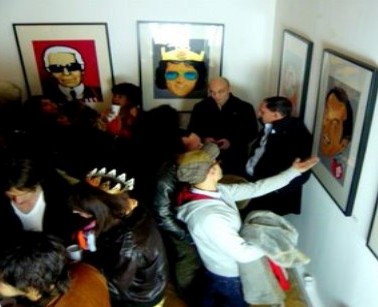 |
 |
| Guidelines
|
|
 |
|
--People
you do business with aren't necessarily your friends.
--They
are not people you go home with. They are a fact of the Art world
and once you're done with them, that's it until next time. In
certain cases you have to tolerate them and perhaps they tolerate
you.
--You
may think they are wrong - or know they are wrong - fine. Deal
with it.
--For
example, if your gallery introduces you to someone who proceeds
to rub you the wrong way, there's likely a reason for the introduction,
so do what you can to maximize the outcome. Hold up your end of
the conversation, keep them happy.
--You
do what works best to get what you want done and that's how the
game is played.
--And
please, oh please, remember the good people who helped you along
your Yellow Brick Road to OZ.
--The
best artists acknowledge their pasts and never forsake them. Ignoring
your past and only talking about where you are now or where you
are going, dissociating yourself from where you've been and people
you've known is counterproductive, especially to those who have
known you.
--Acknowledge
and respect your past, acknowledge your good solid relationships.
There is plenty of room for everybody to prosper together.
--The
flip side, of course, is artists who are ungrateful to those who
assisted them in getting where they are today, artists who put
on airs like they were always great, but that "the people
who count" never realized it until now.
--Two
words on this tact - BAD IDEA!
|
|
|
 |
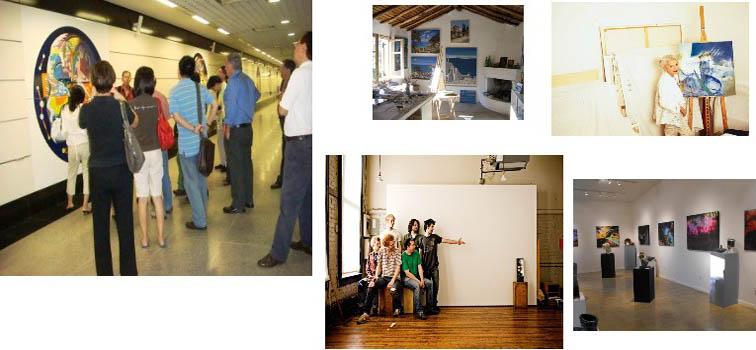 |
 |
--Those
pioneers who took up your cause ahead of the rest, who believed
you had a future - now that you are a luminary, think about maybe
giving a little back - a phone call, a hand written letter, an
inscribed exhibition catalog, a drawing, whatever.
--The
idea that you are thinking of them, appreciating them, and haven't
forgotten them goes further than you can ever imagine. Don't do
it to a fault, but show props to those key figures in your evolution
as an artist. --They
will never forget you.
--Best
of all, you turn them into lifetime supporters who will talk you
up at every chance they get. It's about creating good will and
respecting your past while looking to the future is one excellent
way to create it.
--Speaking
of maintaining and expanding your fan base, seeing as everything's
peachy and you've got a little breathing room, help those less
blessed when the opportunity presents itself, especially those
artists whose work you really like and respect.
--How?
By collecting it. Not only will you end up with Art to look at
besides your own, but you give them encouragement they will always
remember, and you can be sure that, one way or another they will
return the favor.
--Another
aspect of where you were then versus where you are now, and something
to be wary of, is becoming resentful about what you sold stuff
for back in the day.
--The
way your Art goes up in value is based on support people show
for you when you were nobody, and who continue to support you
regardless. If not for them, you wouldn't be where you are today.
--It's
like kicking out the rungs of the ladder below you once you get
to the top. Makes absolutely no sense.
--You
should rejoice every time your Art sells for big bucks, whether
you own it or not, because that makes every piece you've ever
made and every piece you've yet to make much more valuable.
--But
wait, there is more.
--If
you want to participate in your own personal inflationary spiral,
set aside pieces from every body of work you create so that when
prices go up, you've got a percentage of the action.
--See
how easy that is?
|
 |
|
 |
|
 |
--And
now for some behaviours to avoid.
--Being
obnoxious, difficult to work with, constantly promoting or talking
about yourself, or being disrespectful or condescending to others.
--Being
humble and grateful about your good fortune works far more to
your favor than being the opposite.
--You
come up the food chain not because you talk about you or you step
on people's heads, but because other people talk about you, about
how you and your Art has impacted and changed their lives in wondrous
and positive ways.
--Don't
be rude to the people who work with you - gallery staff, framers,
movers, suppliers, or studio assistants. Show respect, get respect.
--No
matter how important you think you are, be courteous. Little things
can come back to bite you, like for example, being nice to your
dealer, but treating the staff like garbage. You think the staff
won't tell the dealer or that the dealer will side with you and
not the staff? Think again.
--Of
course you can be a brilliant artist and a complete jerk. That's
perfectly OK. But don't expect to get famous in your lifetime.
--Even
if you are with a good gallery, any dealer will tell you that
they don't have to work with artists they don't like. Sure, a
gallery might love your work so much they tolerate your crap,
but the moment there's a snag in the plan, they'll turn you out.
Believe it.
--Dealers
have little or no allegiance to artists who give them a hard time.
--Isolated
obnoxious artists do beat the odds and go global, it's true, but
the chances of that happening are consummately slim, even on a
good day. A talented obnoxious artist may well have an ardent
fan base among their peers, they often do, but if they are so
nauseating that no one in any position or influence or authority
can stand to be around them, their fate is basically a foregone
conclusion.
--As
one dealer once confided, if an artist is really good and really
obnoxious and wants to be famous, then dying young is always an
option to fast track their way to stardom. Their Art will be far
easier to deal than they are.
--Then
again, if you are a "bad boy ( or girl )" of the Art
world and have been that way ever since you were nobody, your
devotees tend to accept that inevitability.
--As
you make your ascent, however, the downside is that new converts
may regard you overcompensating for inadequacies, or as having
not yet como to grips with yourself. It's a trade-off you'll likely
have to make.
--Whatever
you do, don't manufacture an arrogant attitude to go along with
your latest work or your newfound notoriety or whatever relative
pinnacle you're at (or perceive yourself as being at).
--Act
how you act, now how you think you should act.
--Additionally,
the risk of consciously deciding to act a certain way, especially
if it's negative, is that you condemn yourself to having to act
that way for the reminder of your days, because that's what your
audience comes to expect.
--The
best way to go, be You and be Nice!
|
 |
|
 |
|
 |
--Now
keep in mind that not all artists are blessed with copious social
skills, pleasant personalities, and steady temperaments. For those
of you who might be lacking in any of these areas, the key is
to know your limitations.
--If
personally working the crowds is not something you do well, for
example, your trusty art dealer will be more than happy to stand
in for you.
--Why?
It's in both your best interests. As they say in the trade, if
you are not good at schmoozing, don't schmooze.
--Awkward
schmoozing is worse than no schmoozing at all.
--Plenty
of artists are uneasy in social settings and anytime you feel
that way about an impending or unfamiliar situation, discuss it
with your dealer or whoever is responsible for your appearance
at such events.
--Tell
them you are not good at openings or whatever, and then make a
plan of action in advance; how long you'll be there, who you'll
talk to, the extent of any obligations you want to take on, and
so on.
--Be
clear. Be honest. Craft a strategy, decide how to play it, decide
how far you feel comfortable going, and then work together to
get through the hard parts.
--Being
up front is always best. Once the two of you understand each other
and the specifics of a given situation, working through it successfully
becomes so much easier.
--And
if you're that much of a problem, be a No Show at your openings.
--Remain
a mystery.
--Your
dealer will take up the slack.
--Swift
sudden attention on you and your Art is never easy to handle,
especially if you haven't been making Art all that long.
--Artists
who become famous later in life tend to be less affected, or taken
by the glamorous trappings of being in the spotlight, and as a
result tend to be better balanced about it, but regardless of
age or experience, understand that one or two high points do not
instantly catapult you into the annals of Art History.
--Consistent
long-term production of superior quality is what eventually eternally
ensconces you in whatever endgame is on your radar. The exposure
has to start somewhere, of course, and sometimes it starts Big,
but this is only the beginning, not the end.
--The
Art world is notorious for loving the next new thing, and today,
the next new thing may be You... but remember, you can only be
the next new thing once.
--Accomplishment
after accomplishment over the long haul trumps fifteen minutes
of fame approximately 100 percent of your time.
--Never
confuse the two. Your name has to be out there constantly. Nothing
happens all of a sudden. |
 |
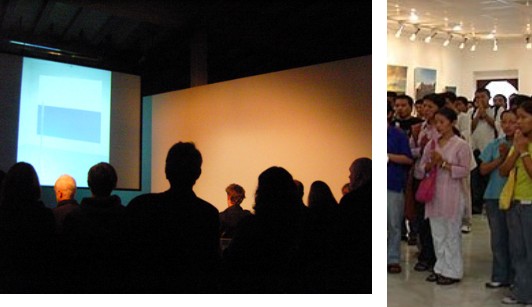 |
 |
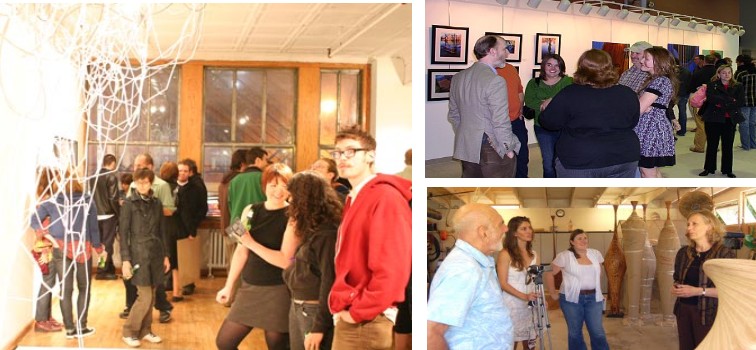 |
 |
--A
corollary caution to receive unexpectedly intense publicity is
the impulse to believe your own hype - good or bad - or worse
yet, to act on it.
--Think
about this for a moment.
--Let's
say someone writes an article about either you or your Art, or
both. You know what that is? It's one person's opinion on one
particular day in one particular publication.
--So
don't get all bloated about it. As they used to say back in the
day when we had newspapers, "Today's News is Tomorrows Fish
Wrap".
--Maybe
take your press seriously after you've had several hundred articles
or reviews and a distinct trend has emerged, but in the meantime,
be happy they spell your name right, and not much more.
--Suppose
you've been making Art for, say, a couple of years - not that
long - and now suddenly you're HOT!
--You
are being solicited from all directions. Seems like everybody
wants something.
--What
happens to a number of artists in this situation is that they
try to do it all, take on too much too fast, expand the operation,
hire assistants, say YES to everything.
--The
downside risk in doing this is that their Art starts to look different
than the Art that got them here in the first place.
--For
instance, they try to make everything look more important or tackle
large-scale pieces that aren't necessarily typical of what they
have produced to this point, and in general, veer off track.
--The
Solution?
--You've
got to keep your obligations manageable and under control. Accept
only those offers you know you can handle, and handle well, and
avoid unfamiliar projects you have no idea if or how you'll be
able to pull off.
--Don't
change your look too fast. You'll be tempted. Don't take jobs
or offers you have no experience with, no matter how fantastic
they sound. Don't spread yourself too thin. Don't try to prove
you are a Renaissance man or woman who can do anything. Take it
slow and deliberately. You've got plenty of time.
--Most
importantly, continue to make what you've been making. That's
what got you here. That's what they want to see.
--Be
aware that you'll have all kinds of opportunities to step outside
your comfort zone, digital art, plastic toys, skateboard decks,
collaborations, a mural for a building, works in experimental
materials, illustration for a magazine cover, and Lord knows what
else.
--Best
advice? Stay on point with your original message and vision. Diversity
is great, but avoid getting into too much too different too fast.
--Continuing
to fine tune and solidify your process is what ascendancy is all
about.
|
 |
 |
 |
--And
if a dealer - or other Art world notable - who knows more than
you, who has substantial experience in the business, or who has
an established reputation, wants to offer some advice or recommendations,
consider it a gift.
--Don't
think they are working against you. Whether they are sending you
off from your past or welcoming you to your future, listen to
what they say and think about it.
--Those
in the Know rarely give advice to artists with the intent to inhibit
their careers.
--You
don't have to do everything they tell you, but you owe it to yourself
to consider their wisdom.
--This
one might sound a little odd, but go easy on the charity auctions.
The better known you get, the more nonprofits will want you to
donate something, and best procedure is to pick and choose here.
--You
see, by giving something to everybody, not only do you risk diluting
the value of your work, but you also begin to give people the
impression that they can buy you on the cheap.
--And
don't believe for an instant that donating or selling at charity
auctions makes you more famous. Not true. It only makes you more
generous.
--A
better idea might be to sell particular works through your galleries,
then take the cash and donate it directly to those organizations
you want to support.
--Targeted
donations here and there are fine, but not to everybody all the
time.
|
 |
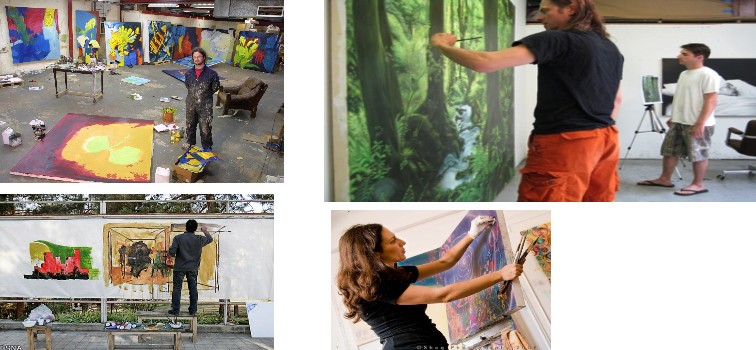 |
 |
--One
critical aspect of ascendency, of course, is the prospect of changing
galleries. Always a delicate situation. --The
key here is not to burn bridges while at the same time, communicating
your needs in ways people can understand and respect.
--Treat
everyone involved fairly and with dignity. They realize things
are different now, there's no need to make drama out of it.
--Be
tactful as you move on, don't hurt people. You never know - you
may have to take a step back if things don't play out the way
you're thinking they will.
--And
be especially careful about going with a particular gallery just
to move on to a better gallery. The longevity of relationships
counts in this business and getting a reputation as a user ultimately
work against you.
--As
for packing your bags and moving to a major international art
center like New York or London or Berlin, make sure you are reasonably
solid in this new geographical realm first; as well as in the
one you're leaving. --You
just might want to come back. A suggested minimum war chest would
be to have six months living expenses in the bank and ready to
deploy in case of emergency.
--Artists
occasionally move from one place to another too fast only to realize
that life is a lot more difficult than they imagined, especially
if the spotlight stops shining.
--Remember,
one or two successes does not make a career. Take each step slowly
and deliberately, especially big ones like leaving your current
home behind.
--Last
but way not least, continue making Art and lots of it. Be possessed,
be prolific.
--You
can't just make enough for a show, get some press, and then go
on sabbatical.
--You
have to be out there and on it all the time. Nobody cares about
yesterday's News, how cute you are, what you wear, or whom you
talked to.
--It's
about your Art!
--The
old adage sums it best. No matter where you go, there you are.
Keep your eye on that one and the rest, as they say, will be...
history!
|
 |
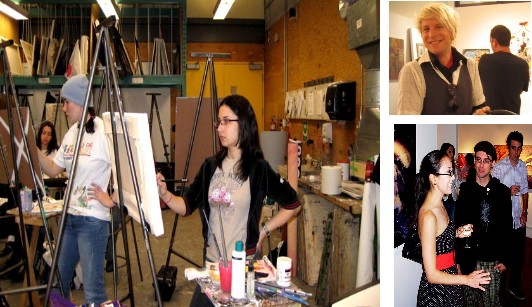 |
 |
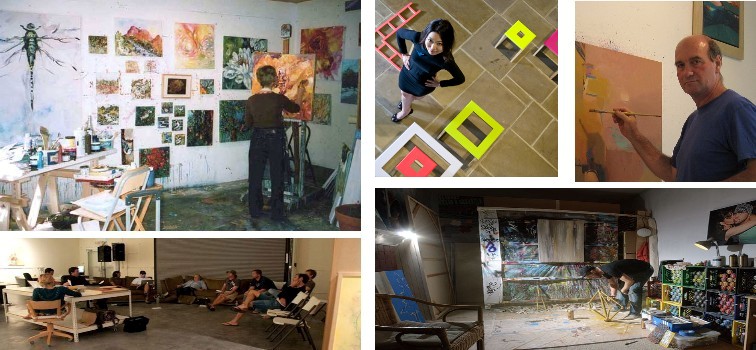 |
 |
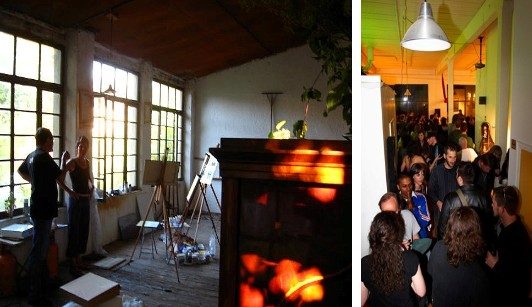 |
 |
|
|
|
|



